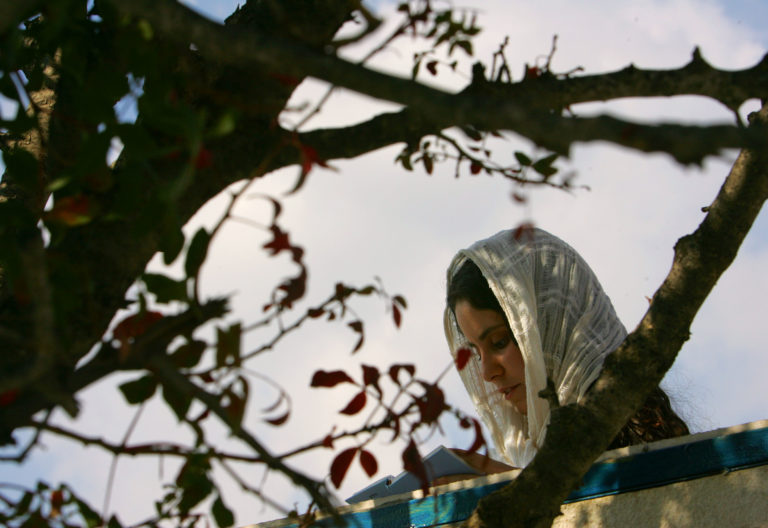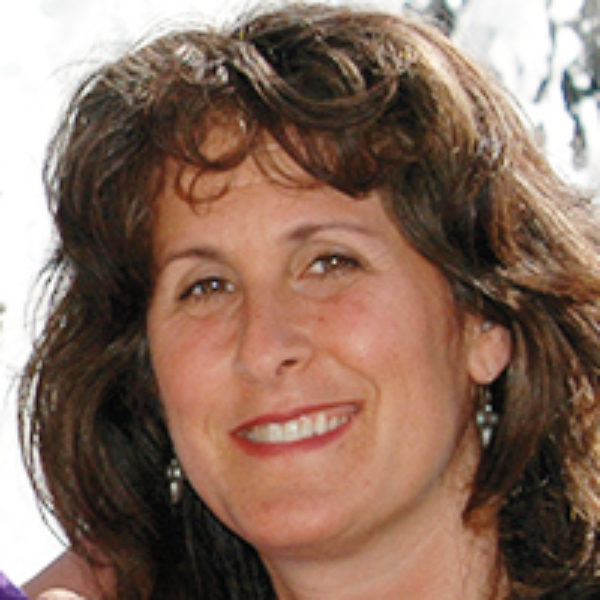
Image by David Silverman/Getty Images, © All Rights Reserved.
What’s Left When You Let Go? Pouring Out Oneself in Those Lone Moments and Quiet Places
My mother is one of those twice-a-year Jews, but, for some strange reason during a brief segment of my childhood, my sister and I went to bed each night with a prayer. A lavender elephant and a yellow giraffe that my mom and her best friend had painted on our bedroom walls floated above our heads as my sister and I chanted:
“Now I lay me down to sleep. I pray the Lord my soul to keep. If I should die before I wake, I pray the Lord my soul to take.”
The sing-song rhythm of it, my sister’s voice riding mine, the fact that it came every single night no matter what happened that day, were a balm to me, until the day we lost it — through apathy, or the hectic first weeks of my brother’s life — a token of childhood, gone.
I still have the phrase, though, unuttered, some 50 years later. I carry it, I think, as a vestige of a time when I dared to speak, one on one, with God.
This was, once, how it may have been for all of us. Laden with the thousands-year-old heft and weight of the rabbinic take on prayer, the siddur, the Hebrew prayer book, we Jews tend to forget that prayer originally, biblically, was about an impromptu moment of encounter with God.
Think of Jacob fleeing Esau in the dark desert night and pausing to build an altar of stone. Think of Sarah, when God’s messenger told her, after some 90 years, that she was to give birth to a child. Her laughter. Not a simple yelp of glee, Sarah’s was a sound rich with emotion.
Between Sarah and ourselves lies the liturgical history of the Jewish people, a legacy that attempts to put us in touch with our highest selves, and is potentially redemptive, and yet for many of us the liturgy often feels to be a burden.
Enter the eighteenth-century Hasidic master Rabbi Nahman of Bratslav. Partaking as it does of both faith and doubt, an almost constant awareness of the absence of God from the ordinary universe of human experience and an equally intense yearning for intimacy with that source of our being, Rabbi Nahman’s quest is one that mirrors my own.
Born on the Sabbath into the family of the Ba’al Shem Tov, the young Master Nahman was dissatisfied with the prescribed prayers of the liturgy and so, alone in the attic of his parent’s house, he composed his own prayers, in the Yiddish that he spoke, pleading with God to draw him closer.
This lone outpouring of the soul before God, a surging emotionalism that Rabbi Nahman experienced in his prayer life is one I’ve touched upon only rarely, and not unsurprisingly, in my darkest hours. Falling airplanes and hospital rooms tend to bring out our most prayerful moments. Yet most of us show up in that room at a disadvantage — we arrive at the place where reason fails us as novices.
Rabbi Nahman’s brand of engagement with God is one he suggests we attempt, at least, regularly. At the heart of it lies discipline — a willingness to enter into divine relationship.
In the early days of my own spiritual quest, I lived for a time within the Orthodox community of St. Louis. Yom Kippur at the Young Israel synagogue on Groby was a place where Rabbi Nahman might have felt at home.
At the Neilah service, as the last ribbons of light streaked the sky outside, over on the men’s side — and yes, this only happened on the men’s side — as the hazzan called out, “Adonai HuhaElohim,” one man at a time gave a g’shrai, a cry, a shriek, “Adonai HuhaElohim.” God is God.
I, too, had been fasting for an impossible 26 hours and in that vacuous, drifting emptiness that was my body and mind at the tail end of this prayer marathon — a sea of black and white tallit swaying, rocking, stamping their feet before me, all the voices now rising. It seemed the shul itself hovered just a few inches above the earth.
I could hear in these prayers the broken hearts we all carry, piercing the surface, finally, of our intensely secular lives. What the Orthodox Jews taught me, and any musician or ballet dancer worth her toe shoes knows, is that prayer, no matter how expansively I want to define it, that is, some act of relinquishing yourself to a higher source of mystery — whether that’s Rabbi Heschel praying with his feet in Selma or a poet with her pen in Cape Cod — has to occur every single day.
For Rabbi Nahman, the most essential religious practice was that of hitbodedut, lone daily conversation with God. Akin to meditation, with one striking difference, Rabbi Nahman said we should set aside a certain period of time each day, preferably out of doors, and always alone, amidst sky, pine, ocean, to “pour out before God,” our most sequestered longings, desires, needs, and frustrations. Rabbi Nahman parts ways with the Buddhists but asserts himself as a precursor to Freud when he says that we need to do this out loud, to verbalize our unspoken inner swirlings.
The Bratslover seems to be speaking to our contemporary selves when he tells us that there will be times, perhaps many, when we set out to converse with God and will be able to do no more than call out. Other days, just repeating a single word over and over again may be the most we can manage.
And he told his Hassidim to do so not in Hebrew, but in their native language of Yiddish. He said, “In the Yiddish we use for ordinary conversation it is easier to break one’s heart.”
Rabbi Nahman seems to know there is a purer distillation of who we are waiting at the still, broken center of each of us. The trappings and masks that adorn our everyday selves fall away when we dare to meet the Divine. This is a God I have known only in my most radiant, faith-driven moments, and I’ve only had glimpses. I came to know Her in my body, lying in savasana, corpse pose, at the end of a yoga class. That sense of peace and wholeness and pure exhaustion the best of yoga teachers can give you — what’s left when you let go completely of everything you don’t need.
Or in the hospital room of a dying friend — her husband’s book of Psalms, only half read, open on the hospital cart before me. Or in the marshes of Wellfleet in Massachusetts, with the poet and priestess Mary Oliver as my guide, feeling in the slow, patient filling in of silver green grasses and dark muddy earth, the returning tide waters, a hint of God-ness, a realm beyond reason, a place where faith is not so foreign. At moments like these, if we’ve been paying attention, the prayer will come.
